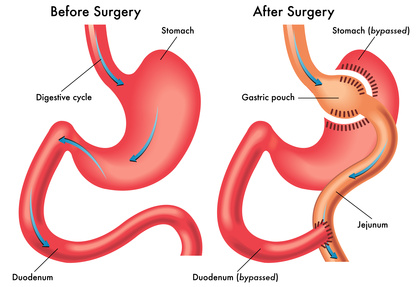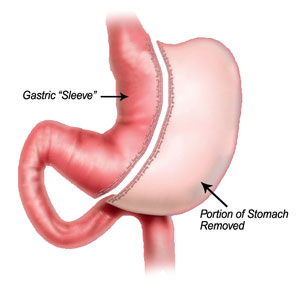 Gastric Sleeve surgery or Sleeve gastrectomy is one of the top picked surgical procedures that leads to weight loss. It is the laparoscopic procedure that restricts food intake. The surgeon takes out about 75 percent part of the stomach and makes a narrow tube or “sleeve” out of the rest. The resultant stomach is banana-shaped and is much narrower than the original. Hence, post operation, you would feel full and eat less.
Gastric Sleeve surgery or Sleeve gastrectomy is one of the top picked surgical procedures that leads to weight loss. It is the laparoscopic procedure that restricts food intake. The surgeon takes out about 75 percent part of the stomach and makes a narrow tube or “sleeve” out of the rest. The resultant stomach is banana-shaped and is much narrower than the original. Hence, post operation, you would feel full and eat less.
Patients undergoing sleeve surgery have to make a life-long commitment of eating healthy and doing regular exercise. If you don’t follow these two post -operation steps, you would end up gaining weight.
Unlike the gastric band and the gastric bypass, the gastric sleeve is a permanent procedure.
Removing a stomach portion reduces the amount of hunger hormone called ghrelin. Thus, people who get sleeve gastrectomy find that they are much less hungry. Ghrelin also impacts blood sugar metabolism. Hence, people suffering from type II diabetes usually see sudden decrease in their diabetes medications (primarily oral medications) after the gastric sleeve.
Gastric Sleeve Procedure
[tabby title=”Before Surgery”]
It takes months of efforts to prepare for this major surgery. Patients need to show their genuine interest and willingness to make a big change in their eating and exercise habits before the surgery.
 You will meet with a team of doctors and surgeons few months before the surgery . They provide counselling on how is the surgery conducted. The surgeons will examine you and set up the right expectations related to surgery. They also advise on what to expect before and after surgery.
You will meet with a team of doctors and surgeons few months before the surgery . They provide counselling on how is the surgery conducted. The surgeons will examine you and set up the right expectations related to surgery. They also advise on what to expect before and after surgery.
A dietician will teach you healthy eating basics like good nutrition, how to get regular meals, and the right portion sizes. Gastric sleeve permanently reduces the size of the stomach. Your diet will decrease. Your dietician will educate you on what and how much you can eat after surgery. It is a lifetime commitment to healthy lifestyle.
During Gastric Sleeve Surgery
Gastric sleeve is an hour procedure. The surgeon makes a few small incisions in your stomach and insert a laparoscope — a device with a tiny camera that sends pictures to a monitor. The surgeon inserts other medical instruments through the additional cuts and take out 3/4 of your stomach. Finally, he will attach the rest of your stomach to form the “sleeve” or tube.
[tabby title=”After Surgery”]
After the surgery, you’ll probably stay in the hospital for 2-3 nights so that doctors and nurses can monitor your recovery. They will give you medicines for pain or nausea (feeling sick), help you to get up and move around, They will make sure you can drink liquids without vomiting.
Diet after gastric sleeve
It takes about a week to recover from the gastric sleeve surgery. However, you won’t be able to munch on regular food for several weeks. Your special diet plan includes just liquid diet in the beginning. Your dietician will give you an eating plan that gradually works up to solid foods; for example:
- The dietician recommends high-protein drinks for the initial 2-3 weeks of surgery. Then, you will start puréed foods.
- After first month, you’ll switch to eating soft solid foods very slowly.
- After 2 or 3 months, you can switch back to regular meals. But remember, the quantity of food will be less.
Gastric sleeve surgery reduces the size of your tummy — permanently. You have to make a lifelong commitment to have healthy eating habits
- Everything must be chewed thoroughly before being swallowed.
- Don’t drink while you eat, as this might cause your new stomach to overfill.
- Drink liquids a half-hour after finishing a meal.
- Avoid high-calorie sodas and snacking.
- Take vitamin and mineral supplements every day.
[tabbyending]
Why Gastric Sleeve?
The gastric sleeve offers combined benefits of both the gastric band and the gastric bypass. This process doesn’t involve a foreign object and saves you from many complications of the gastric band, including the following:
- Conducted laparoscopically as an outpatient surgery
- Escapes the technical and long-term problems of the gastric bypass
- Doesn’t require maintenance or artificial implants like those linked with gastric banding
- It achieves weight loss comparable to that of the gastric bypass
- Virtually eliminates ghrelin
- Notable improvements in diabetes, hypertension and sleep apnea
- Recommended by the American Society for Metabolic and Bariatric Surgery
Gastric Bypass Surgery Cost
India is the topmost destination for patients who seek low cost obesity surgery. The cost usually varies on the basis of treatment chosen and the medical conditions of the patient. The prices underneath are given in USD.
USA $18,000
UK $13,000
India $5,000
Thailand $7,500
Singapore $9,000
Brazil $14,000
The cost of the Gastric Sleeve surgery in India is a portion of the cost for the same treatment and care done in the US and other developed countries. Just a reminder, low costs does not impact the quality of medical treatment.
Gastric Sleeve Surgery in India is the best option to a medical tourist from abroad. The hospitals for gastric sleeve in India offer attractive packages to medical tourists, which enables them to save thousands of dollars. These packages include gastric sleeve cost, and all the costs that a foreign medical traveller would otherwise incur including boarding, hotel booking, travelling accommodation and food costs.
The success of Gastric Sleeve
Laparoscopic Sleeve Gastrectomy (Tube Gastrectomy) successfully achieves weight loss. In fact, it has been reported to have reduced more than 60% weight.
Compared to the gastric band, where you need to eat slowly, the Laparoscopic Sleeve Gastrectomy (Tube Gastrectomy) is less demanding. Make sure you should follow what the surgeon and dietitian recommends during the first 6 weeks.
Gastric Sleeve Success Stories & Reviews
Candidates For Gastric Sleeve
As you know Gastric Sleeve is a type of Bariatric Surgery. It is the most effective way for weight loss when diet and exercises failed. If anyone struggling with obesity and health risks like diabetes, heart diseases and more then, the gastric sleeve may help you. But it isn’t a “fix it and forget it” kind of surgery. Not everyone who wants the surgery will be eligible to get it.
If anyone struggling with obesity and health risks like diabetes, heart diseases and more then, the gastric sleeve may help you. But it isn’t a “fix it and forget it” kind of surgery. Not everyone who wants the surgery will be eligible to get it.
- If your body mass index (BMI) is 40 or more. 100 pounds overweight for men and 80 pounds overweight for women with age of 18 or older.
- Obesity-related illnesses such as diabetes, high blood pressure or high cholesterol and heart disease also.
- Traditional Weight Loss method, diet, and exercise did not work for you.
- If you are prepared to make substantial changes in your eating habits and lifestyle.
- If you are smoker and drinker, you are not qualified for this surgery. You have to stop smoking at least for one month before and one month after the surgery.
Gastric Sleeve Surgery FAQs
Advantages
Gastric Sleeve is a safe and easy procedure, therefore, no risk of dumping syndrome. This syndrome passes the food in stomach unaffected by gastric juice and causes indigestion, pain, diarrhea. Gastric sleeve surgery does not need any artificial devices to put inside the body. That means you never feel slip, erode or infection.
Gastric Sleeve surgery performs in a minimally invasive manner, reduce the time of hospital stay with fast recovery from surgery include pain, blood loss. Gastric surgery may be a good option for you if you are suffering from asthma, obstructive sleep apnoea, diabetes, arthritis, high blood pressure, high cholesterol and gastroesophageal reflux disease (GERD).
